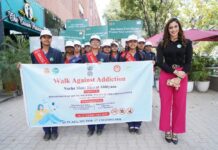Experts dwell on Tobacco Product Waste ‘ its Health and Environmental impact in a National Consultation organized by PGIMER and SIPHER Strategic Institute of Public Health Education and Research (SIPHER) in collaboration with E-Resource Centre for Tobacco Control (E-RCTC) under Department of Community Medicine & School of Public Health, PGIMER Chandigarh, and The Union South-East Asia (The Union) hosted a National Consultation on Tobacco Product Waste (TPW), its Health and Environmental impact.
The
important consultation targeted at creating awareness among the officials
in Ministries of Health and Environment along with States/UT Pollution
Control Boards, tobacco control professionals, environmental experts,
researchers, academicians and civil society advocates who are active on
the issue. Welcoming the eminent experts Dr. Rakesh Gupta, President
SIPHER said that, The tobacco epidemic is one of the biggest public health
threats the world has ever faced, killing more than 8 million people a year
around the world and more than 1.25 million per year in India.
Dr Sonu Goel, Professor, Department of Community Medicine and
School of Public Health, PGI, Chandigarh elaborated that, our aim is
“Protecting environment from tobacco product waste”, as Tobacco product
waste (TPW) has received little attention despite post-consumption litter
produced by the approximately 6.3 trillion cigarettes smoked globally
every year.
Sharing an overview of the important issue, Dr Rana J Singh, Regional
Director, The Union South-East Asia said that, Cigarette filters are
made of cellulose acetate, which is a nearly non-biodegradable plastic
that collects chemicals that are produced by smoking. This plastic
component of filtered cigarettes may not degrade in the environment for
many years.
Dr. Amit Yadav, Senior Tech Advisor, TC, The Union SEA, Mr. Chandra
Bhushan CEO iFORESTS, Dr. Jagdish Kaur, Regional Adviser, Tobacco
Free Initiative WHO Regional Office for South-East Asia; Prof. Dr. Pankaj
Chaturvedi, Deputy Director, Tata Memorial Centre and HOD Dept. of
Head and Neck Surgery, TMH, Mumbai; Dr. PC Gupta, Director of Healis
Sekhsaria Institute. of Public Health, Mumbai; Dr. Ravindra Khaiwal, Addl.
Prof PGIMER were the eminent panellists’ who dwelled upon various
aspects of the issue.
Mr Chandra Bhushan,an eminent environmentalist and CEO of
iFORESTS , elaborated that the regulatory changes that have taken place
in the tobacco waste product management. While listing methods to
minimize TPW burden on the environment, Mr Bhushan said, “The
Government is in process to develop guidelines for cigarette butt disposal
by December. The country has done tremendous work on the health
aspect of tobacco; however, the environmental aspect is yet to be worked
on”.
Prof. Pankaj Chaturvedi Mumbai added that Tobacco not only kills 13.5
lac Indians who consume it but also kills many more millions by adversely
impacting our environment. Tobacco users should be conscious that they
are patronising an Industry that will not only kill them but also cause
humongous damage to our nature endangering all living species and
polluting air/water/soil.One tree is cut for every 300 cigarette sticks.
Dr. Jagdish Kaur elaborated that WHO FCTC has provisions to deal with
TPW if implemented earnestly.Adding on she said that,some 300 billion
cigarette packs that produce an estimated 1 800 000 tonnes of waste
paper, cellophane, foil and glue; and trillions of cigarette butts that are
littered.
Dr.PC Gupta said that even after deterioration, TPW may persist as small
particles of toxic-infused plastic waste, which can leach into soil and water
supplies. One smoked Cigarette butt soaked in a liter of water for 96 h
reached the Lethal Concentration 50 (LD 50) for test Fish that were
exposed to the leachates.
Dr Amit Yadav stated that tons of plastic waste is also generated in the
form of pouches in which smokeless tobacco and pan masala is packaged.
The Environment ministry had ordered a ban of use of plastic packaging
for tobacco, gutkha in 2015-16 itself. The ministry passed its order after
the companies failed to adhere to the Supreme Court directive asking
them to adhere to the new Plastic Waste Management (PWM) Rules,
2016.
Mr.C.D.Singh, IFS, Regional Office, MoEF, Chandigarh who was the
Guest of honour appreciated SIPHER and PGIMER for such lively and high
standard discussions. He said that it will give enough impetus to CPCB to
come up with effective guidelines on very relevant and important
subjects. Once done it will bring in an industry wise holistic approach in
solving all related problems simultaneously.
Following recommendations came out of the consultation:
1. Given that cigarette filters are useless in reducing harm to the average
smoker and therefore, making cigarette butts, which primarily contains
cellulose acetate, only cigarettes without filters may be manufactured
2. Prohibit tobacco product waste under COTPA requiring its proper
disposal and impose hefty penalty for littering (tobacco waste littering
tax) tobacco products waste cigarette/bidi butts, tobacco pouches,
electronic cigarette cartridges and batteries etc.
3. Require sale of tobacco products in a standardized packaging of no less
than 50 cigarettes and no less than 100 grams for other tobacco products
and only in a plain tin pack
4. Onus of compliance with the provision should be placed equally on the
manufacturers, distributors, retailers and the users
5. State tobacco control coordination committee should include a member
from the state pollution control board to guide about the disposal of
tobacco products wastes.
6. The central pollution control board should classify tobacco product
wastes including spitting induced from tobacco use as toxic waste
7. National missions on cleanliness like Swachh Bharat Mission and the
Swachh-Nirmal Tat Mission should include tobacco product waste free as a
criterion for compliance
8. Central, State and District pollution control boards should inform the
public about the toxicity and environmental hazards of tobacco product
waste
9. All manufacturers, distributors and retailers of tobacco comply with
FSSAI, Drugs and Cosmetics Act Poisons Act, Indian Penal Code, Juvenile
Justice Act, Prohibition on ENDS Act, Environment Protection Act etc.
Mr Arun Verma from SIPHER said that the Ministries of Environment,
Health and Family welfare and Central Pollution Control Board must take
note of the recommendations for filing a reply to NGT for dealing with
tobacco waste.




















